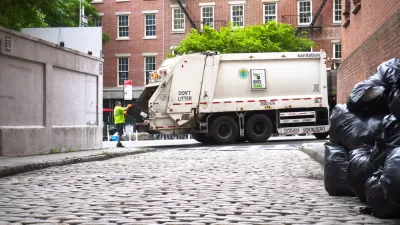With New York City on the verge of reorganizing the private sanitation industry, union organizer Allan Henry connects the dots between street safety, worker rights, and environmental impacts.

Each day, in the daylight, employees of the Department of Sanitation pick up 12,000 tons of trash generated by homes and residences. But the waste generated by businesses, offices, and restaurants — roughly 5.5 million tons annually — is someone else’s business. Those who work for “hauling” or “carting” companies in the private sanitation industry must lift, sling, transport, and dump commercial trash at night. Their convoluted routes crisscross the five boroughs, shaping our urban environment through noise, exhaust, and too-frequent accidents that injure passersby and haulers alike.
Allan Henry, a former hauler himself, now spends his nights organizing with the Transform Don’t Trash coalition to push for an exclusive zone franchise system, which would limit how many companies collect trash in each section of the city. The system could strengthen government oversight on safety violations, and reduce greenhouse gas emissions associated with waste removal by close to 70 percent. So what’s the hold up? As Henry described during a ride-along this spring, one block on the road to change is workers’ fear that the existing system is stacked against them. But with companies fighting reorganization tooth and nail, it’ll take a united front to get the private waste industry to clean up its act.
FULL STORY: Haul Together

Alabama: Trump Terminates Settlements for Black Communities Harmed By Raw Sewage
Trump deemed the landmark civil rights agreement “illegal DEI and environmental justice policy.”

Study: Maui’s Plan to Convert Vacation Rentals to Long-Term Housing Could Cause Nearly $1 Billion Economic Loss
The plan would reduce visitor accommodation by 25% resulting in 1,900 jobs lost.

Planetizen Federal Action Tracker
A weekly monitor of how Trump’s orders and actions are impacting planners and planning in America.

Wind Energy on the Rise Despite Federal Policy Reversal
The Trump administration is revoking federal support for renewable energy, but demand for new projects continues unabated.

Passengers Flock to Caltrain After Electrification
The new electric trains are running faster and more reliably, leading to strong ridership growth on the Bay Area rail system.

Texas Churches Rally Behind ‘Yes in God’s Back Yard’ Legislation
Religious leaders want the state to reduce zoning regulations to streamline leasing church-owned land to housing developers.
Urban Design for Planners 1: Software Tools
This six-course series explores essential urban design concepts using open source software and equips planners with the tools they need to participate fully in the urban design process.
Planning for Universal Design
Learn the tools for implementing Universal Design in planning regulations.
Caltrans
Smith Gee Studio
Institute for Housing and Urban Development Studies (IHS)
City of Grandview
Harvard GSD Executive Education
Toledo-Lucas County Plan Commissions
Salt Lake City
NYU Wagner Graduate School of Public Service





























